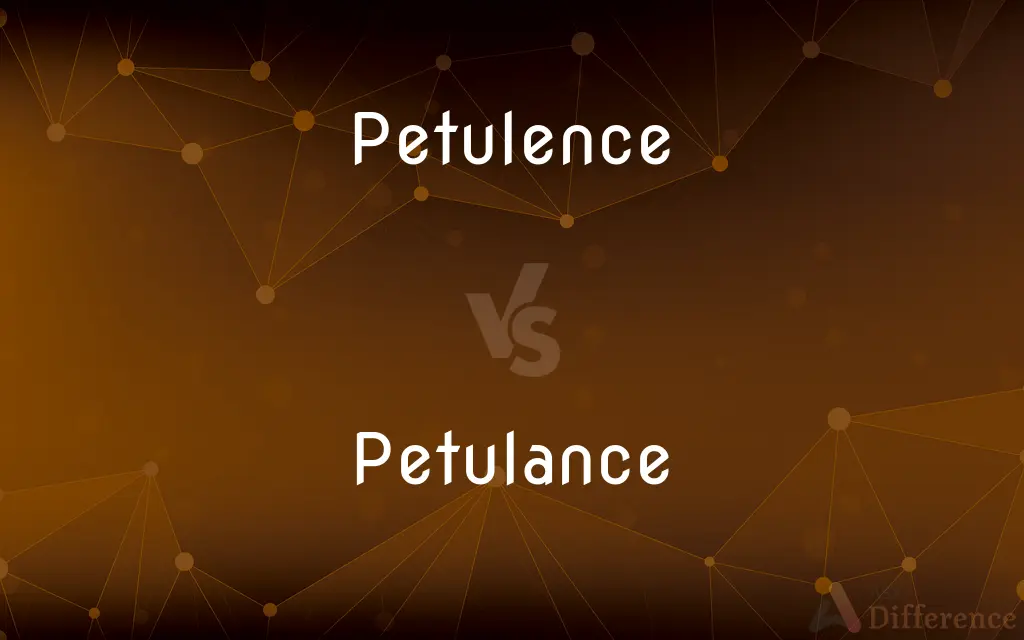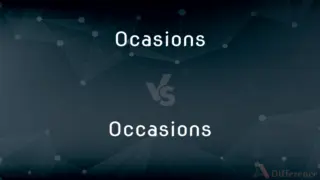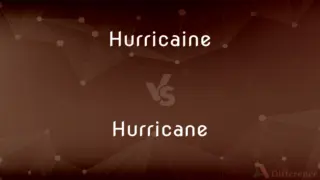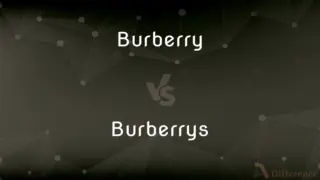Petulence vs. Petulance — Which is Correct Spelling?
By Tayyaba Rehman — Updated on March 30, 2024
"Petulence" is an incorrect spelling. The correct spelling is "Petulance," referring to impatience or irritability.

Table of Contents
Which is correct: Petulence or Petulance
How to spell Petulance?

Petulence
Incorrect Spelling

Petulance
Correct Spelling
ADVERTISEMENT
Key Differences
Think of the "u" in "Petulance" as standing for "unpleasant" because of the meaning.
Recall the phrase “Pet a lance” to picture "Petulance."
"Petulance" is related to "petulant," which means irritable; both have the “a” before the "nce."
Remember the word "petal" from a flower and add "ance" to get "Petulance."
"Petulance" sounds like "pet-you-lance," helping to remember the "u."
ADVERTISEMENT
How Do You Spell Petulance Correctly?
Incorrect: She apologized for her moment of petulence during the argument.
Correct: She apologized for her moment of petulance during the argument.
Incorrect: Despite his achievements, he often displayed an air of petulence.
Correct: Despite his achievements, he often displayed an air of petulance.
Incorrect: His petulence at being denied a second dessert was noticeable.
Correct: His petulance at being denied a second dessert was noticeable.
Incorrect: The child's petulence was evident when he stomped his feet.
Correct: The child's petulance was evident when he stomped his feet.
Petulance Definitions
Petulance means a quickness to get annoyed.
Her petulance grew as the meeting dragged on.
Petulance refers to the quality of being childishly sulky or irritable.
His petulance was evident when he didn't get his way.
Petulance can indicate a display of peevish impatience.
She showed her petulance by huffing loudly.
Petulance denotes the characteristic of being unreasonably irritable.
Lack of sleep often results in petulance.
Unreasonably irritable or ill-tempered; peevish.
Contemptuous in speech or behavior.
(obsolete) Rudeness, insolence.
(obsolete) An insolent remark or act.
Childish impatience or sulkiness; testiness.
The quality or state of being petulant; temporary peevishness; pettishness; capricious ill humor.
Like pride in some, and like petulance in others.
The lowering eye, the petulance, the frown.
An irritable petulant feeling
Petulance describes the state of being easily irritated or annoyed.
Morning traffic always brings out my petulance.
Petulance Meaning in a Sentence
She rolled her eyes in petulance when asked to redo the assignment.
Petulance isn't a trait that gets better with age if not addressed.
After being grounded, his petulance only seemed to increase.
The teacher addressed the student's petulance with a calm discussion.
The petulance in his voice was clear when he was told "no."
Her petulance over such minor issues surprised everyone.
Handling a teenager's petulance requires patience and understanding.
Even a hint of petulance can sour a conversation.
The petulance of the spoiled cat amused the guests.
The novel's main character is both charming and full of petulance.
His petulance at losing the game was not well received by his teammates.
The toddler's petulance was at full display during the long car ride.
Petulance often leads to regrettable decisions or actions.
Apologies are often necessary after acts of petulance.
The habit of petulance can be unlearned with effort and awareness.
The petulance displayed at the meeting was noted by all present.
Understanding the reasons behind petulance can help in addressing it.
A moment of petulance can undermine an otherwise strong argument.
Petulance in adults is often seen as childish or unprofessional.
Recognizing one's own petulance is the first step toward maturity.
Dealing with petulance effectively can strengthen relationships.
Petulance in the workplace can lead to unnecessary conflicts.
Learning to control petulance is part of growing up.
Common Curiosities
Which vowel is used before Petulance?
"An" as in "an act of petulance."
What is the verb form of Petulance?
There isn't a direct verb form; however, "to be petulant" can convey a similar idea.
Why is it called Petulance?
Derived from Latin "petulans" meaning "impudent" or "forward."
What is the root word of Petulance?
The Latin word "petulans."
Which conjunction is used with Petulance?
Any conjunction can be used based on the sentence structure.
What is the plural form of Petulance?
Petulances.
Which preposition is used with Petulance?
"Of" as in "petulance of a child."
What is the pronunciation of Petulance?
/ˈpɛtʃ.ʊ.ləns/.
Which article is used with Petulance?
Both "a" and "the" can be used depending on the context.
Is Petulance a noun or adjective?
Noun.
Is Petulance a collective noun?
No.
Is the Petulance term a metaphor?
No.
What is the singular form of Petulance?
Petulance.
Is Petulance an abstract noun?
Yes.
Is Petulance a vowel or consonant?
"Petulance" is a word, not a single letter.
How do we divide Petulance into syllables?
Pet-u-lance.
What is the first form of Petulance?
Petulance (being a noun, it doesn't have verb forms like first, second, third).
Is the word “Petulance” a Direct object or an Indirect object?
It can be a direct object depending on the sentence.
Which determiner is used with Petulance?
Any determiner like "this," "that," "his," "her" can be used based on context.
What is the second form of Petulance?
N/A (it's a noun).
How is Petulance used in a sentence?
"Her sudden outbursts were a clear sign of her petulance."
Is Petulance a countable noun?
It can be, as in "acts of petulances."
Is the word Petulance a gerund?
No.
What part of speech is Petulance?
Noun.
What is another term for Petulance?
Irritability.
What is the opposite of Petulance?
Patience or agreeableness.
What is the third form of Petulance?
N/A (it's a noun).
Is Petulance an adverb?
No.
Is Petulance a negative or positive word?
Negative.
Is the word Petulance imperative?
No.
How many syllables are in Petulance?
Three syllables.
What is a stressed syllable in Petulance?
The first syllable, "Pet."
Share Your Discovery

Previous Comparison
Ocasions vs. Occasions
Next Comparison
Wraped vs. WrappedAuthor Spotlight
Written by
Tayyaba RehmanTayyaba Rehman is a distinguished writer, currently serving as a primary contributor to askdifference.com. As a researcher in semantics and etymology, Tayyaba's passion for the complexity of languages and their distinctions has found a perfect home on the platform. Tayyaba delves into the intricacies of language, distinguishing between commonly confused words and phrases, thereby providing clarity for readers worldwide.









































